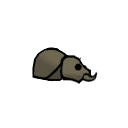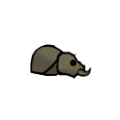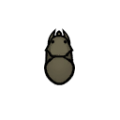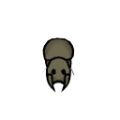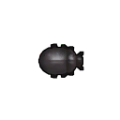Megascarab
Megascarab
A large, genetically-engineered beetle. Once the worker caste of an artificial ecosystem of insectoids designed to fight mechanoid invasions, it is now often seen without its deadlier insectoid cousins. Still, its size and hard shell make it dangerous when it attacks. A eusocial creature, it cannot reproduce individually.
Base Stats
Armor
- Armor - Sharp
- 72%
- Armor - Blunt
- 18%
Pawn Stats
- Combat Power
- 40
- Move Speed
- 3.75 c/s
- Health Scale
- 40% HP
- Body Size
- 0.2
- Mass - Baby
- 2.4 kg
- Mass - Juvenile
- 6 kg
- Mass - Adult
- 12 kg
- Carrying Capacity
- 15
- Filth Rate
- 1
- Hunger Rate
- 0.16 Nutrition/Day
- Diet
- omnivorous, animal products
- Life Expectancy
- 10 years
- Manhunter Chance
- 50%
- Manhunter Chance (Taming)
- 0%
- Trainable Intelligence
- Intermediate
- Available Training
- Guard, Attack
- Wildness
- 20%
- Minimum Handling Skill
- 2
- Maturity Age
- 0.4 years (24 days)
- Juvenile Age
- 0.03 years (1.8 days)
- Toxic Resistance
- 100%
- Toxic Environment Resistance
- 80%
- Vacuum Resistance
- 100%
- Comfortable Temp Range
- 0 °C – 60 °C (32 °F – 140 °F)
Production
- Meat Yield
 31 Insect meat
31 Insect meat
Melee Combat
- Attack 1
- Mandibles
5 dmg (Bite)
7 % AP
2 second cooldown - Attack 2
- Head
4 dmg (Blunt)
6 % AP
2 second cooldown
0.1 chance factor - Average DPS
- 1.55
- defName
- Megascarab
- tradeTags
- AnimalInsect
Megascarabs are a type of Insectoid.
Acquisition[edit]
Megascarabs can be found in regular and extreme deserts, under mountains in caves or infestations and inside ancient shrines, including inside the caskets. They can be tamed by a handler.
Summary[edit]
They are ground beetles of metallic color that posses elytra, a protective shell that provides some armor. Megascarabs are hazardous to hunt, for if they are injured by a human or a mechanoid, they will turn manhunter and attack any human or mechanoid on the map they can reach. If slain, they can be butchered for insect meat. Colonists dislike eating any insect meat, but meat-eating animals have no such problem.
All insectoids, including the megascarab, experience hypothermic slowdown instead of fatal hypothermia, have 100% Toxic Resistance, rendering them immune to toxic buildup from any source, and 80% Toxic Environment Resistance, rendering them resistant to environmental effects such as rot stink. They experience also pollution stimulus when in polluted terrain.![]() See that page for full details.
See that page for full details.
Insectoids are incapable of sexual reproduction like other animals, due to their breeding type (EusocialInsect). Instead, wild insects reproduce via hives which create new insectoids periodically, up to a maximum value each hive can support. Tamed insectoids cannot reproduce at all. For more detail, see the Hive page.
Analysis[edit]
Combat[edit]
Megascarabs are the smallest and fastest of the 3 insectoid types, and will often catch up to colonists and "lock" them into melee. It may be wiser to focus on bigger targets, like megaspiders, as they are stronger in combat.
Melee block tactics work well against infestations in general. In an open field, kiting works well, as even megascarabs are slower than a healthy human.
Taming[edit]
Megascarabs offer no real niche as a tamed pet, however they can be tamed. Unlike the larger insects, they can generate non-hostile, and are found naturally in deserts.
Training[edit]
This animal can be trained as follows:
| | |
| | |
| | |
| |
*As of version 1.1.2610, all animals can be tamed. The percentage of likelihood of success depends on factors such as the Animals Wildness Percentage, Pawn Handling Skill, and others. More information can be found on the animals page.
Health[edit]
Body parts[edit]
The body part table is collapsed due to length. Expand to view.
| Part Name | Health | Quantity | Coverage[1] | Target Chance[2] | Subpart of | Internal | Capacity[3] | Effect if Destroyed/Removed |
|---|---|---|---|---|---|---|---|---|
| Shell | 12 | 1 | 100% | 28.0% | N/A[4] | - | - | |
| Elytra | 12 | 2 | 5% | 5.0% | Shell | - | - | |
| Stomach | 8 | 1 | 5% | 5.0% | Shell | Digestion |
−50% Digestion | |
| InsectHeart | 8 | 1 | 3% | 3.0% | Shell | Breathing Blood Pumping Blood Filtration Digestion |
Death | |
| Pronotum | 8 | 1 | 18% | 6.3% | Shell | Eating Talking Breathing |
Death | |
| InsectHead | 12 | 1 | 65% | 1.5% | Pronotum | - | Death | |
| Brain | 4 | 1 | 20% | 2.3% | InsectHead | Consciousness |
Death Damage always results in scarring. | |
| Eye | 4 | 2 | 15% | 1.8% | InsectHead | Sight |
−25% Sight. −100% if both lost. Damage always results in scarring. 0% Hit Chance against Blunt damage. | |
| Antenna | 4 | 2 | 10% | 1.2% | InsectHead | - | - | |
| InsectNostril | 4 | 1 | 7% | 0.82% | InsectHead | - | - | |
| InsectMouth | 4 | 1 | 10% | 1.2% | InsectHead | Eating Manipulation |
−100% Manipulation −90% Eating[5] | |
| InsectLeg | 8 | 6 | 6% | 6.0% | Shell | Manipulation Moving |
−16.7% Moving[6] |
- ↑ Coverage determines the chance to hit this body part. It refers to the percentage of the super-part that this part covers, before its own sub-parts claim their own percentage. For example, if the base coverage of the super-part is 100%, and the coverage of the part is 20%, 20% of hits would hit the part, and 80% the super-part. If the part had its own sub-part with 50% coverage, the chances would be 10% sub-part, 10% part, 80% super part.
- ↑ Target Chance is the actual chance for each part to be be selected as the target when each part's coverage has been taken into account(I.E. Neck covers 7.5% of Torso but Head covers 80% of Neck so it actually has only a 1.5% chance to be selected). This is not pure hit chance, as different damage types propagate damage in different ways. See that page for details.
- ↑ Note that capacities can affect other capacities in turn. Only the primary effect is listed. See specific pages for details.
- ↑ This is the part that everything else connects to to be considered 'connected'.
- ↑ Note that eating won't go below 10%. See specific pages for details.
- ↑ If Moving drops below 16% a pawn cannot move.
Armor[edit]
| Armor |
|---|
Attack table
| Attack (Damage type) |
DPS[1] (Post Hit Chance)[2] |
Dam. | Cool. | AP | Selection chance[3] | |
|---|---|---|---|---|---|---|
| Average | 2.5 (1.55) |
- | - | 7% | - | |
| Mouth (Bite) |
2.5 (1.55) |
5 | 2s | 7% | 100% | |
| HeadAttackTool (Blunt) |
2 (1.24) |
4 | 2s | 6% | 0% | |
- ↑ Note: This is the actual base average derived from the melee verb system updated in 1.1.2610, it may sometimes disagree with the listed value in the in-game infobox.
It may also change depending on the stats and the melee verbs available to the pawn. - ↑ Assuming a melee hit chance of 62%
- ↑ Chance for attack to be selected. It may change depending on the melee verbs available to the pawn.
Gallery[edit]
Version history[edit]
- Beta 19/1.0 - All insects main attack cooldowns 2.5 -> 2.9
- Some time between A6 and A13 - Sprite changed.
- 1.3 - Revenge on tame fail decreased from 20% to 10% - revenge on harm increased from 35% to 50% - wildness decreased from 95% to 20%.
- Biotech DLC release - Now gains pollution stimulus on polluted terrain.
